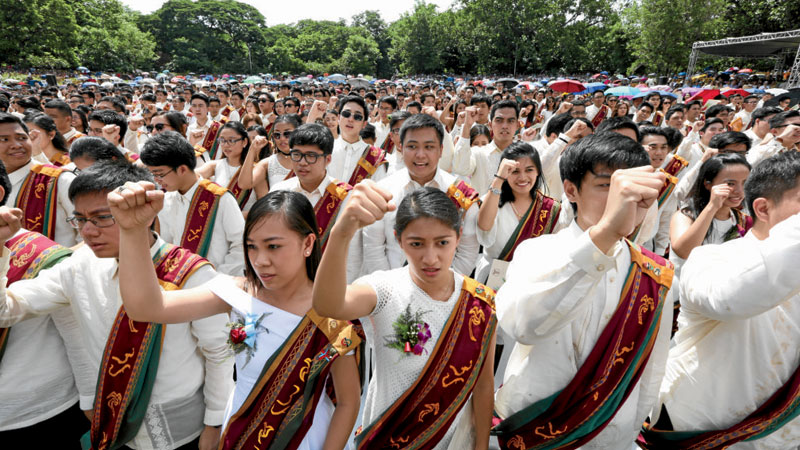
With the customary raising of fists as a final act during the 105th commencement exercises of the University of the Philippines, graduates of the country’s premier academic institution sing “UP Naming Mahal” at the University Amphitheater on the UP Diliman campus in Quezon City. (File photo by NIÑO JESUS ORBETA / Philippine Daily Inquirer)
MANILA, Philippines — In response to the persistent issue of brain drain in the country, President Ferdinand “Bongbong” Marcos Jr. urged the development of a strategy aimed at persuading graduates to remain in the Philippines and contribute their skills for a few years before considering opportunities abroad.
According to Marcos, it was “fine” with him if graduates, particularly of health and information technology-related courses, opt to practice their professions abroad.
However, he also said that this results in the loss of talent the country has trained.
“We have to come up with some kind of strategy wherein, let’s say, you provide scholarships and then the scholarship agreement includes that you stay three years. After that then they’re free to go,” Marcos said during the Private Sector Advisory Council-Jobs Sector Group (PSAC-Jobs) meeting on Thursday, which was relayed by the Presidential Communications Office through a statement on Friday.
Officials from PSAC agreed that the local labor market for health care and information technology sectors cannot match the high pay offered in the United States, the United Kingdom, Australia, and Europe.
“I think what we can do is to continue to offer certificate programs and train their skills. I think we can do that. There’s no way for us to retain them,” said Teresita Sy-Coson of SM Investments Corp, who presented the proposals in the meeting on behalf of the PSAC Jobs sector.
“Even in the digital, if we train them in the cybersecurity or in whatever advanced technology, they’ll also leave. If only we can get them for two years, good enough na rin,” Coson added.
The PSAC-Jobs also suggested to Marcos the further reinforcement of his earlier directive to prioritize the creation of a coordinated game plan in which various government agencies can negotiate with other countries on hiring Filipino workers.
These include the Department of Health, the Commission on Higher Education, the Department of Migrant Workers, and the Department of Foreign Affairs.
The PSAC likewise said that the DOH’s human resources for healthcare master plan should be supported.
This includes requiring hospitals or schools to adopt them, equipping them with the proper skills to participate in the country’s labor force, and requiring them to stay in the Philippines for at least two years.
ALSO READ
Bill seeks P50,000 monthly pay for public, private nurses
Marcos urges ASEAN to address brain drain in healthcare sector

